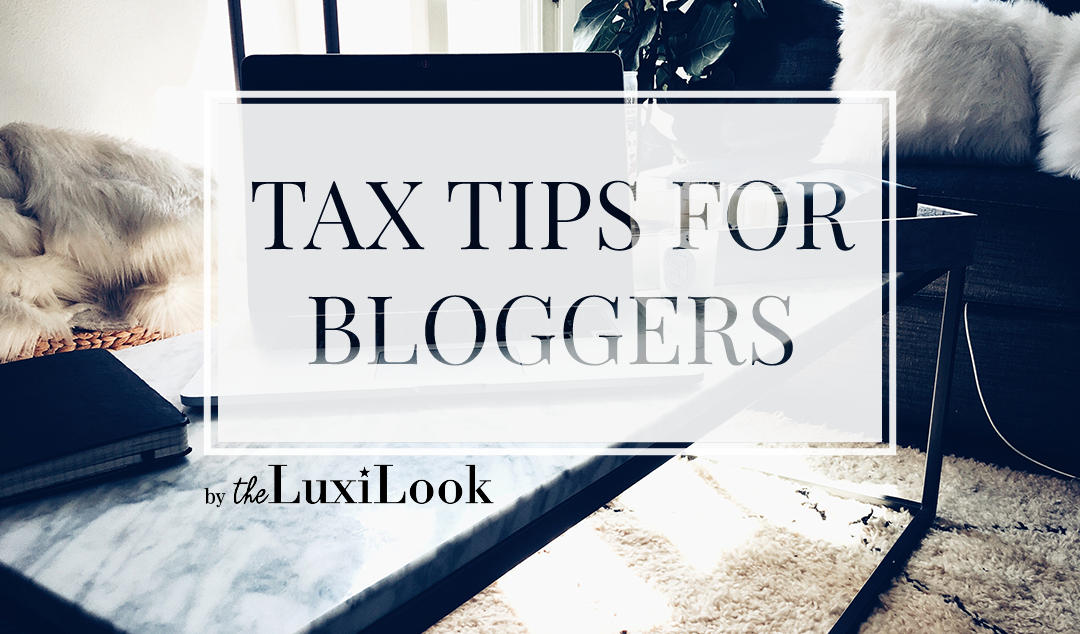It’s tax season! I know… SO exciting. Let’s face it – taxes suck. Accounting was one of my least favorite classes in school and to this day is something I have zero interest in. However, if you’re earning an income, you have to pay your taxes. As someone who has worked a 9-to-5 and filed taxes as a full time employee for the past five years, I can tell you how different filing taxes as a blogger/freelancer/small business owners is.
I am NOT a professional (nor do I claim to be), and the very first thing I would recommend is to find someone who is! Because trust me, this is NOT something you want to do on your own. Leave it to the professionals. Taxes for bloggers are more complicated because your income is not automatically withheld from every paycheck. You receive your gross income over the course of the year and are expected to pay taxes on that amount at the end of the year. When you work for a corporation, these taxes are automatically taken out of each paycheck. So if you’re looking for tax tips for bloggers and freelancers, read on.
Let’s Talk Money: Taxes for Bloggers
Everyone handles tax season differently. As I mentioned above, taxes for bloggers can be complicated because they are paid differently than your typical W2 employee. Bloggers can be paid directly by brands and companies that they work for, they can have multiple streams of income, and they can even pay themselves through a company they have established. Some people do their own taxes, but I personally did not feel comfortable doing mine on my own. After doing a lot of research online, talking to friends in a similar employment situation, and speaking to my accountant, I wanted to share the most important tips for bloggers & freelancers to help you manage tax season.
Tax Tips for Bloggers:
+ Find an accountant you trust.
Referrals are best, because then they have already been vetted by someone you know and trust. If you can’t get a good recommendation, then do your research online and read reviews carefully. A good accountant will charge a couple hundred dollars or more (this is tax deductible the next year) and absolutely worth the investment. The way I see it, time is money, I’m not an expert in the tax law, and I want to make sure things are done the right way. Paying someone ensures that your taxes will be filed properly and you will be able to maximize all of your deductions (this is very important for bloggers! >> more on this later).
+ Get a head start on tax season.
Like many things in life, this is not something you want to procrastinate on. If you have an accountant, it’s as easy as staying organized and meticulously keeping track of all business related income and expenses throughout the year so you can pass it on. This will make your accountant’s life easier when filing your taxes as well!
You need to report ALL of the income you earned over the past year – this income includes sponsored posts, consulting, affiliate revenue, product revenue, etc. – all of this is considered taxable income. A brand will issue a 1099 form if they paid you over $600 over the past year – be sure to save these and give to your accountant so they can keep track of your blogging income. However, even if you do not receive a 1099, you still need to report the income earned – it’s very important to do this properly in the event you ever get audited by the IRS.
+ Stay organized.
I highly recommend keeping a spreadsheet to track everything throughout the year. I have one where I keep track of collaborations (brand, deliverable, timing, payment & terms) and expenses. Also, I recently signed up for Quickbooks and pay $5/month for the Self Employed App, which helps me track this information and have a holistic view of my blogging business in the current year as well. You can also track mileage through this app, which you can deduct at the end of the year.
+ Open a business bank account.
This is so important for keeping finances separate and organized for your business entity.
+ Save a portion of every paycheck.
Because bloggers do not pay taxes upfront, you are expected to pay an estimated tax every quarter, as well as self-employment taxes. Even if you are a full time employee somewhere else, if you earn income on your blog, you will have to pay taxes for Social Security and Medicare that are traditionally paid for by an employer and employee. The point here – you will have to pay taxes afterwards. A safe rule of thumb is to save about 30% of every paycheck. This way, in the event that you end up owing a large amount of income in taxes, you already have the money ready and do not have to dip into savings. The amount owed will change based on your deductions, which takes me to my next point…
+ Know what you can and cannot deduct.
The benefit of owning your own business is being able to deduct business expenses from your taxable income. What this means is you are able to subtract your business expenses from your total income. Then pay taxes on the remaining income. However (!!) not everything is tax deductible, and this is where things can get a little dicey. According to the IRS, a business “may deduct ordinary and necessary expenses for conducting a trade or business.” The IRS defines ordinary business expenses as those that are “common and accepted in your trade or business.” They define necessary expenses as those that re “helpful and appropriate for your trade or business.” So what does this mean for bloggers?
First, you have to be making a profit after three years. If you have more deductions than income for over three years, the IRS will consider your blog a hobby as opposed to a business, and will not allow you to take these deductions going forward.
Some expenses that you should be able to deduct because they are directly business related include:
+ Advertising
+ Website hosting & anything else related to running your website – this can include web design, graphics, logos, and freelance help.
+ Photography expenses – editing software & equipment
+ Office supplies and furniture used for your business (if your home can be considered your office, you may also be able to deduct a portion of your rent and utilities)
+ Electronics (your computer & camera)
+ Conferences related to blogging
+ Mileage tied to blogging related activities
+ Travel and entertainment directly related to blogging. This can be dicey. You cannot take a vacation overseas, post twice, and then consider it a business expense. Talk to your accountant as what can or cannot be classified as a travel related deduction.
Expenses that you cannot deduct (sorry!) include beauty related expenses (hair, nails, makeup) and clothing (that would be nice, though!).
When it comes to tax law, there is a bit of gray area around deductions. How you handle this is ultimately up to you and your accountant. However, many experts agree that generally it is better to err on the side of caution. So be slightly more conservative than aggressive with the expenses you deduct.
Hopefully this post helped shed some light on how to manage tax season as a blogger (or similar freelancer!). I know taxes can be incredibly intimidating and not fun to say the least. However it is so important to do them the right way! Again, I highly recommend working with a professional on this matter, especially as your business continues to grow. However, these are some of the basics. So they should help you get an idea of where to begin on your taxes.







